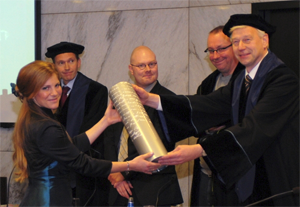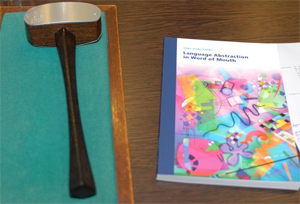Language Abstraction in Word of Mouth
 In conversations, consumers like to discuss their product and service experiences with other consumers. These conversations are important and influential sources of information as they may impact consumer buying decisions. In her dissertation entitled Language Abstraction in Word of Mouth, Gaby Schellekens analyses the language consumers use when they describe their product experiences. The results of her research show that consumers use more abstract language when they describe experiences that are in line with their prior opinions of a product. In addition, more abstract descriptions generally have a larger impact on other consumers. This dissertation focuses on the specific language that consumers use when they describe their experiences. For example, if a brand new shirt lost its color after one or two washes, one could say to a friend “My shirt has faded,” or one could say “My shirt was of poor quality”. In the former case, consumers provide a very concrete description of what has happened. In the latter, they use more abstract wording, which generalises this single experience to an overall impression of the shirt’s quality. Schellekens: “This dissertation should be of interest to business for two reasons. First, the findings indicate that abstract messages have a stronger impact on buying intentions. This can be straightforwardly translated into the recommendation to use abstract language if you try to convince someone to buy a product. Thus, if you want persuade a friend to buy a pen of your favorite brand, you should not communicate that the pen “writes good”, but that “it is good”. For those who are trying to limit the impact of negative messages that they need to convey, the findings suggest that concrete language is more appropriate. When trying to avoid a negative impression while having to describe bad behavior, you are better of claiming “he behaved criminally” instead of stating that “he is a criminal”. Secondly, my findings may help firms to interpret consumer word of mouth. Currently, many companies are monitoring word of mouth (especially online), and try to learn from customer feedback that is available for example in blogs and product reviews. This dissertation introduces a distinction between abstract and concrete language, and this new dimension may help firms go beyond traditional measures such as volume and frequency of positive and negative word of mouth.”
In conversations, consumers like to discuss their product and service experiences with other consumers. These conversations are important and influential sources of information as they may impact consumer buying decisions. In her dissertation entitled Language Abstraction in Word of Mouth, Gaby Schellekens analyses the language consumers use when they describe their product experiences. The results of her research show that consumers use more abstract language when they describe experiences that are in line with their prior opinions of a product. In addition, more abstract descriptions generally have a larger impact on other consumers. This dissertation focuses on the specific language that consumers use when they describe their experiences. For example, if a brand new shirt lost its color after one or two washes, one could say to a friend “My shirt has faded,” or one could say “My shirt was of poor quality”. In the former case, consumers provide a very concrete description of what has happened. In the latter, they use more abstract wording, which generalises this single experience to an overall impression of the shirt’s quality. Schellekens: “This dissertation should be of interest to business for two reasons. First, the findings indicate that abstract messages have a stronger impact on buying intentions. This can be straightforwardly translated into the recommendation to use abstract language if you try to convince someone to buy a product. Thus, if you want persuade a friend to buy a pen of your favorite brand, you should not communicate that the pen “writes good”, but that “it is good”. For those who are trying to limit the impact of negative messages that they need to convey, the findings suggest that concrete language is more appropriate. When trying to avoid a negative impression while having to describe bad behavior, you are better of claiming “he behaved criminally” instead of stating that “he is a criminal”. Secondly, my findings may help firms to interpret consumer word of mouth. Currently, many companies are monitoring word of mouth (especially online), and try to learn from customer feedback that is available for example in blogs and product reviews. This dissertation introduces a distinction between abstract and concrete language, and this new dimension may help firms go beyond traditional measures such as volume and frequency of positive and negative word of mouth.”
Gaby Schellekens defended her dissertation on 30 November, 2010. Her promoter was <link people ale-smidts _self>Prof. dr.ir. Ale Smidts, Professor of Marketing Research at RSM. Co-promoter was <link people peeter-verlegh _self>Dr.ir. Peeter Verlegh. Other members of the doctoral committee were Professor Dirk Smeesters, Professor Stijn van Osselaer from RSM and Professor Wigboldus from Radboud University Nijmegen.
About Gaby Schellekens
Gaby Schellekens (1978) was born in ‘s-Hertogenbosch, The Netherlands. In 2000, she obtained a bachelors degree in Communication (HEAO Eindhoven) and then studied psychology at the Radboud University Nijmegen. She obtained a masters degree in Fundamental Social Psychology in 2005. Her thesis was on unconscious persuasion in consumer behaviour and she completed this study with an internship at Unilever Research & Development. In September 2005, Gaby became a PhD student at the department Marketing Management at the Rotterdam School of Management, Erasmus University. Her PhD research is focused on language use in word of mouth. She presented her work at international conferences, such as Association for Consumer Research and the European Marketing Academy Conference. Gaby also published a mayor part of this dissertation in the Journal of Consumer Research (August 2010), the leading journal in consumer behaviour.
Abstract of Language Abstraction in Word of Mouth
 In word of mouth, consumers talk about their experiences with products and services with other consumers. These conversations are important sources of information for consumers. While word of mouth has fascinated researchers and practitioners for many years, little attention has been paid to the question of how consumers talk about products and brands, and whether and how this moderates the extent to which they influence other consumers. This dissertation fills this gap, and focuses on the language that consumers use when they describe their experiences. For example, if your brand new shirt lost its color after one or two washes, you could say to your friend “My shirt has faded,” or you could say “My shirt was of poor quality”. In the former case, you provide a very concrete description of what has happened. In the latter, you use more abstract wording, which generalizes this single experience to an overall impression of the shirt’s quality. This dissertation focuses on language abstraction, because abstractness is an important aspect of language, and it can be coded unambiguously and relatively easily. A series of experiments examined when and why consumers use abstract versus concrete language in word of mouth, and how these differences in language use affect the receiver of the word-of-mouth message. Among other things, the results show that consumers use more abstract language when they describe experiences that are in line with their prior opinions about a product, and that more abstract descriptions generally have a larger impact on other consumers.
In word of mouth, consumers talk about their experiences with products and services with other consumers. These conversations are important sources of information for consumers. While word of mouth has fascinated researchers and practitioners for many years, little attention has been paid to the question of how consumers talk about products and brands, and whether and how this moderates the extent to which they influence other consumers. This dissertation fills this gap, and focuses on the language that consumers use when they describe their experiences. For example, if your brand new shirt lost its color after one or two washes, you could say to your friend “My shirt has faded,” or you could say “My shirt was of poor quality”. In the former case, you provide a very concrete description of what has happened. In the latter, you use more abstract wording, which generalizes this single experience to an overall impression of the shirt’s quality. This dissertation focuses on language abstraction, because abstractness is an important aspect of language, and it can be coded unambiguously and relatively easily. A series of experiments examined when and why consumers use abstract versus concrete language in word of mouth, and how these differences in language use affect the receiver of the word-of-mouth message. Among other things, the results show that consumers use more abstract language when they describe experiences that are in line with their prior opinions about a product, and that more abstract descriptions generally have a larger impact on other consumers.


